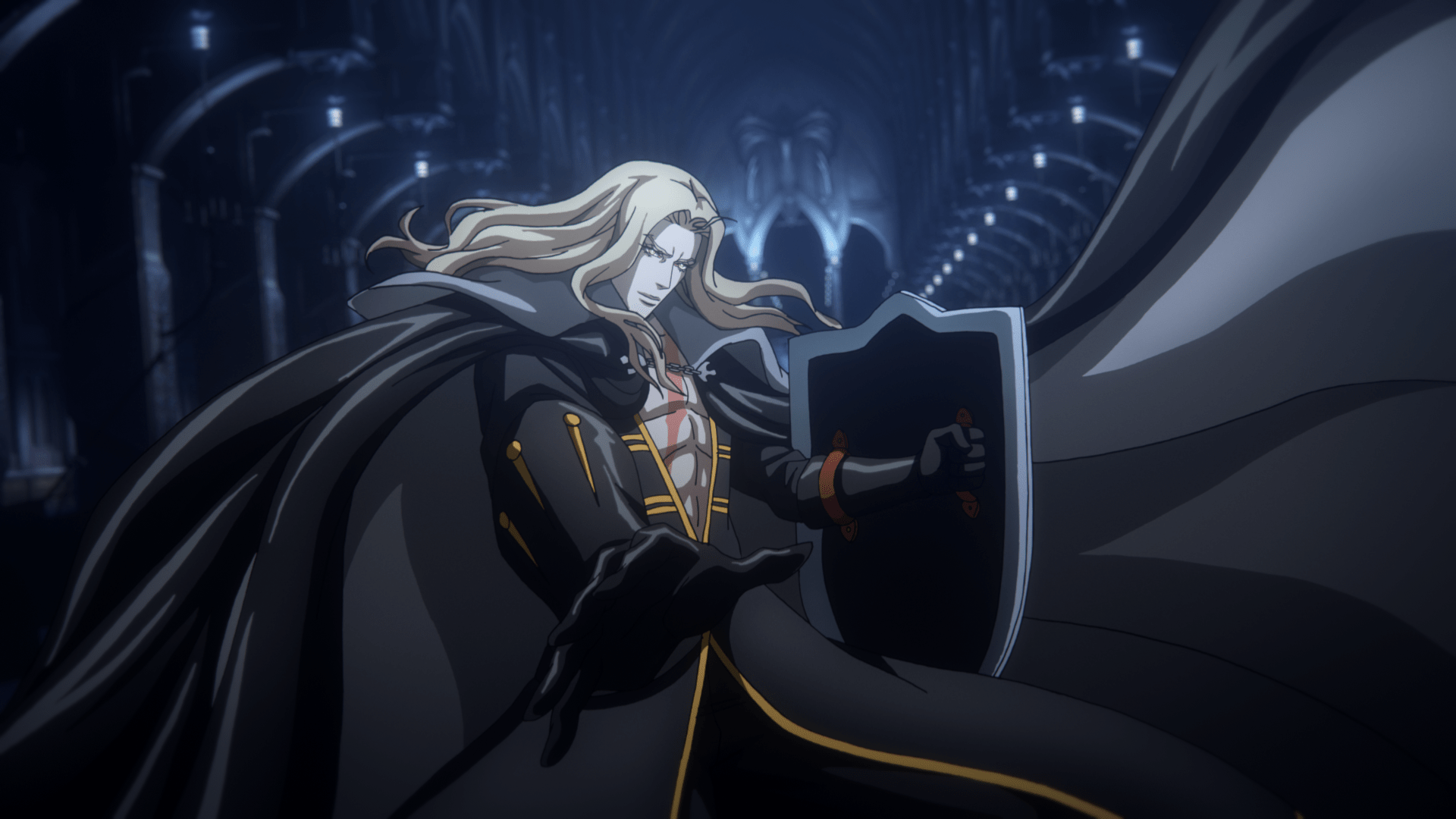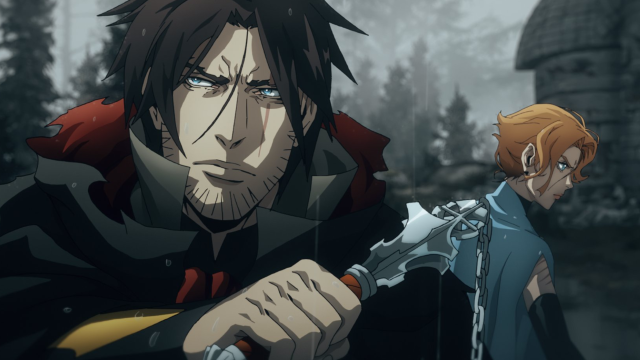There’s a moment roughly halfway through Castlevania’s final season when, at the height of an arduous, suitably bloody, and rather fantastic fight sequence, one character yells at another “This is about Dracula, isn’t it!?” And… that’s it. That’s the show, for better and worse, as Netflix’s Castlevania cracks its whips for one last time.
For all the monstrous threats the heroes of Netflix and Powerhouse’s animated take on the world of the Konami video game icon have faced over four seasons — from corrupt churches and the big (and sad) Vlad himself to eldritch horrors and beyond — arguably the greatest challenge Castlevania faces is in bringing things to a close. It’s understandable that there’s a sense of trepidation here; The show ended its third season with its heroes off on different, haunting paths, its various antagonistic forces embroiled in schemes of their own.
To bring all these threads together, alongside new ones, and then pull them around to a satisfying end, is a daunting task. Especially when we now know that with the show’s end comes the potential for new stories in its universe. It’s a good thing then, that Castlevania sticks the landing, for the most part. The problem is that it takes an awfully long time spinning wheels and lots of ideological pontificating to get there.

Set just a few weeks after the events of the third season, Castlevania season four opens with an aimlessness that quickly becomes the thematic thrust of every major character and group we’re re-introduced to over its first few episodes. All the while it’s setting up new threads to hang the wider series arc on. Trevor and Sypha (voiced by Richard Armitage and Alejandra Reynoso, respectively), utterly devastated by the grim events at Lindenfeld, find themselves wandering, fighting off stray night creatures just for something to do rather than because they want to. Alucard (James Callis) is similarly despondent, melancholically biding his time in his father’s castle, avoiding people until a chance for adventure — and connection — comes his way from a local village leader, Greta (Marsha Thomason).
On the other side, our villains feel like they’re going through the motions; Isaac (Adetokumboh M’Cormack) — having spent much of last season building up forces in a quest for vengeance against the former lieutenants of Dracula (Graham McTavish) — begins the season in an extended period of self-reflection, contemplating what could come after his revenge. Likewise, the Council of Styria — Striga (Ivana Milicevic), Morana (Yasmine Al Massri), and Lenore (Jessica Brown Findlay) — all find themselves unsure of the direction their sister Carmilla (Jamie Murray) is taking their plans to create a stable vampiric empire of their own, now that forge master Hector (Theo James) has been seemingly bent to their will.

That’s an awful lot of self-reflection and sense of purposelessness, however, so thankfully there is some lifeblood of intent in the opening of the series that provides much needed forward momentum: one is a familiar character, in Bill Nighy’s returning alchemist Saint Germain, continuing his quest to find his former lover in the mystical Infinite Corridors, at any cost. The others are a couple of new additions, Varney of London (Malcolm McDowell) and Ratko (Titus Welliver), two vampires of Dracula’s earliest court, who plot the return of their master’s soul to reclaim the city of Targoviste in his name, the city the Count once rained bloody vengeance upon for burning his human wife Lisa (Emily Swallow) at the stake.
Given that we’ve just needed to explain the setup for six different focal points for the series over the course of the last three paragraphs, you might not be surprised to hear that there is simply far too much unfolding over the sluggish course of season four’s opening episodes. Those episodes are meticulously paced, but languishing, as characters largely stand around and either spout their ideologies at each other (or simply to themselves), questioning what their true purpose in life even is at this point given the absence of Dracula, the one figure that united all these myriad groups in one form or another in the past. It’s wonderful tone work — continuing on from the bleak melancholy last season ended on — but brief bursts of kinetic action or a few darkly humorous gags (mostly from Trevor and Sypha) do little to help a good chunk of the season just feel like wheel-spinning rather than purposefully reflective.

This plays a part in the way the 10-episode season is largely set up. The opening half focuses on Isaac’s slow but certain march on Styria and Carmilla in particular, as Trevor, Sypha, Alucard, and Greta’s storylines are left lingering in the background. When Isaac’s arc comes to its natural conclusion, he vanishes out of the season. It’s almost abrupt, given the opening episodes’ intense focus on him, but it allows Castlevania to pivot to the duelling, eventually intertwined threads of Alucard and Greta’s defence of the latter’s besieged refugees, and Trevor and Sypha uncovering Varney’s plots in Targoviste.
The structure is an attempt to give each arc the focus it needs, as it comes in the final hours of this story. However, because they’re largely siloed from each other, everything feels isolated and distractionary whenever our focus is drawn to the myriad other plots. It’s a similar issue that season three suffered from, but now that even more units of characters are thrown into the mix, it’s only compounded.
The better news is that the back half of the season feels much quicker on its feet. This is in part thanks to the majority of the action set pieces of the season taking place there — and that action is better than it ever has been in the series, both in its scale and in its slick, graceful choreography. At long last, it’s when Castlevania realises something that feels like it’s been absent from the show for far too long at this point: the series is at its best when Trevor, Alucard, and Sypha are together as a team.
The moment their arcs finally join and the real plan weaved through the background of the season (albeit very slowly) is revealed is a moment of grand catharsis, and one of the most satisfying scenes in the entire show. It’s not just because of the chemistry Armitage, Reynoso, and Callis clearly have but because the series suddenly begins firing on all cylinders. Everything clicks, as if the team behind the show knows that once they are together, it can go all out — and does so with a rip-roaring energy that reminds you of the series’ highest highs.

This energy is, delightfully, maintained as the show reaches its climax, and comes down from the giddy heights of its final, truly incredible action moments to have a period of introspection and reflection that works at this point in the series, rather than interfering with its build up. For a show that has often, and fascinatingly so, wallowed in the grief and despair of its world, it’s surprisingly welcome to say that Castlevania ends on a refreshingly hopeful note. In a season that touches on a sense of purposelessness throughout its cast, the final mediation on Trevor, Sypha, and Alucard’s arcs finds them satisfyingly given send offs that echo that theme well. You finally get to spend time with the characters you’ve wanted to spend time with the most, and the way their stories are closed — an excellent farewell — is satisfying enough to make the earlier, messier build up the season took to get there worth it in the end.
For many people, that may be enough. Castlevania sticks the landing in such a way that it’s easy to forgive the arduous journey it takes to get there. The things the show has always hit with (its action, its heroic trio) remain highlights here, and the things it’s always struggled with (pace, and the long shadow Dracula’s absence has cast since his defeat in season two) remain consistent weaknesses. For better or worse, Castlevania goes out in a thoroughly Castlevania-y manner: a show that knew itself almost from the get-go better than any of the many video game adaptations in its wake. Hopefully, however, whatever’s set for its world in the years to come can learn from a few of its mistakes.
Castlevania’s fourth season begins streaming on Netflix May 13.
